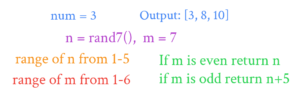Table of Contents
Problem Statement:
Implement Rand10() Using Rand7() Leetcode Solution – Given the API rand7() that generates a uniform random integer in the range [1, 7], write a function rand10() that produces a uniform random integer in the range [1, 10]. You can only call the API rand7(), and you shouldn’t call any other API. Please do not use a language’s built-in random API.
Each test case will have one internal argument n, the number of times your implemented function rand10() will be called while testing. Note that this is not an argument passed to rand10().
Example:
Example 1:
Input: n = 3
Output: [3, 8, 10]
Explanation:

Example 2:
Input: n = 2
Output: [2,8]
Approach:
Idea:
- First, we declare 2 variables,
nandm, setting them initially to berand7()and7. - Then we make sure that
nis only in the1 - 5range and, if not, we regenerate it and assignn - 5tom, that thus would be in the1 - 2range. Note that in this waynandmhave the same probability of still being each specific number in their own range. - In the second loop, we make sure that
mhas a1 - 6value, with similar logic of regenerating numbers until we need them. - Finally, we return
norn + 5, depending ifmis even or odd, respectively.
Code:
C++ Program of Implement Rand10() Using Rand7() :
class Solution {
public:
int rand10() {
int n, m;
n = rand7(), m = 7;
while (n > 5) {
m = n - 5;
n = rand7();
}
while (m == 7) m = rand7();
return (m % 2 ? 5 : 0) + n;
}
};Java Program of Implement Rand10() Using Rand7() :
class Solution extends SolBase {
public int rand10() {
int n, m;
n = rand7();
m = 7;
while (n > 5) {
m = n - 5;
n = rand7();
}
while (m == 7) m = rand7();
if (m % 2 == 0) return n;
else return n+5;
}
}Complexity Analysis for Implement Rand10() Using Rand7() Leetcode Solution:
Time Complexity:
The Time Complexity of the code is O(1) in the average case but in the worst case.
Space Complexity:
The Space Complexity of the code is O(1) because we don’t need any extra space to solve this problem.